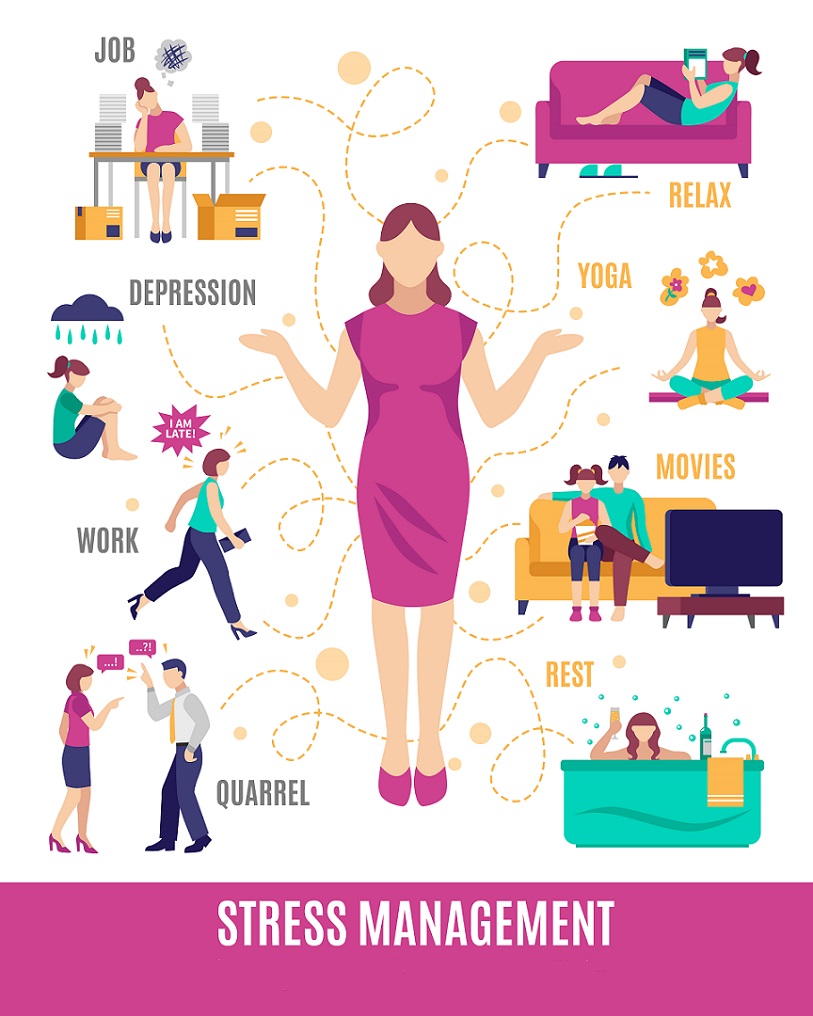Meditation For Stress Management:
“You need to lower the amount of stress you experience on a day to day basis”. You’ve probably heard this advice before. Most likely from close friends, family, or your doctor. However, as trite as this saying is, getting rid of stress is crucial for your long-term health and well-being, but can be easier said then done, right? As more people look for natural ways to reduce stress, we’ll discuss using meditation for stress management.

People don’t just say stress is a killer for no reason. In fact, stress can lead to both declines mentally and physically. Stress can cause issues like headaches, heartburn, weakened immunity, increases in blood sugar, to depression, insomnia, and even fertilely problems.
Crazy, right!
So how can you effectively manage your stress and live a happier and more fulfilling life?
In this post, we’ll explore one of the most effective stress management techniques in our minds. Meditation has gained much notoriety and popularity in recent years.
Some of the earliest written records of meditation are from Hindu tradition, in India.
Meditation has been around for thousands of years. Furthermore, has other benefits, then just helping to reduce stress. This ancient practice has been used in countries all around the world to create inner balance, connection, and peace.
In addition to this, though, meditation may be the perfect way for you to cope & manage stress, more successfully.
The Impact of Stress On The Body

Stress can have a very negative impact on your health, indeed. There is a high mental load of stress, like feelings of anxiousness and emotional exhaustion, which can make it harder to perform at work and at home. In addition, you also have the physical side of stress. People don’t always consider the bodily impact of stress from a physical standpoint, but it is very real, and very dangerous.
You may not see major health issues right away, but over time, your body can deteriorate from stress. The potential totality of stress on the body is diverse. Albeit far to much to discuss in an individual article. Today, we are geared more towards how meditation, specifically, can help you to manage your stress-load.
Why You Need To Use Meditation For Stress Management:

So where does meditation come into play? Meditation is one of the most effective, non-intrusive and non-invasive ways to manage your stress levels. Meditation has been studied and researched more over recent years.
Below, we’ll go into some of the research on meditation and mindfulness practices, and how they may be effective in helping individuals deal with daily stress.
It’s important to understand, however, like many things in life, meditation is something you get better with as time goes on within your practice. However, managing just a few minutes per day, may be a recipe to successfully connecting to yourself in a better, healthier way.
How Meditation Plays a Role In Stress Management:
Meditation can take time and practice to learn. However, once you fully understand how to meditate, you can reduce the amount of stress you feel in your life. Sometimes, you can do this even more effective than other stress relief measures.
1. Meditation Reverses Your Fight or Flight Response

When we’re stressed, our body enters a fight or flight state. This is a normal reaction, part of our sympathetic nervous system. Epinephrine and other hormones are released. This heightened state causes our heart rate to increase, blood pressure to rise, breathing to become shallow, as well as things like increased inflammatory responses and cortisol production.
Staying in this state of stress is never good for your body.
Luckily, practices like meditation and yoga (and other relaxation techniques) can help reverse your flight or fight response. When you meditate, it’s possible to achieve fairly quick relief from these symptoms. Your heart rate and blood pressure will most likely decrease, and with a few deep breaths, you may even feel a sense of relief over your body.
In fact, there is a study that suggests people who meditate, experience changes in gene expression, opposite of that which occurs during “fight or flight”. However, these changes are more apt to occur within practitioners that have used meditation more long term.
Even if you have experienced years of stress, you can still see changes in symptoms of stress.
Another study suggests that mediation helps with regulating stress response. For example, suppressing issues like chronic inflammation, and may be useful incorporating into conventional health care and wellness models.
2. Your Mood is Boosted Through Neurotransmitters
In addition to ridding your body of stress symptoms, meditation helps release mood-boosting chemicals in the brain. Meditation helps the body enter a state of deeper and healing rest. Mindfulness meditation is known to alter certain areas of the brain. These areas are associated with things like memory, self awareness and compassion.
When this state is triggered, your brain releases a number of brain chemicals. These are known as neurotransmitters. It has been suggested that certain types of meditation, like transcendental meditation increases GABA (gamma-aminobutyric acid) levels, thus decreasing anxiety levels.
Serotonin, another powerful neurotransmitter may also be released, which helps in mood regulation.
These neurotransmitters work directly on happiness and energy levels. When more of them are released through meditation, you may be more apt to stay calm, and relaxed.
3. You Feel More Relaxed and Can Sleep Better

Not only can meditation help you boost your mood and feel less stressed, this stationary activity may also promote a sense of calm and relaxation that lasts throughout your day and into the evening. If you’re someone who has difficulty falling asleep or staying asleep, meditation may be a regimen you want to add.
Feeling on edge and stressed can be uncomfortable, but it can also lead to poor sleep quality. With less sleep, we enter a vicious cycle of stress. The less sleep we get the more stress we’re potentially going to feel, as sleep is crucial to emotional stability and rationality. Without it, we fall prey to stress and it can be one big cycle.
Meditation may have the ability to increase levels of melatonin (a sleep hormone), and or serotonin (which is a precursor to melatonin). Likewise, decrease physiological symptoms, such as heart rate and blood pressure, which may in turn put us in a more relaxed state.
In one such study, mindfulness meditation showed improvements in sleep quality immediately postintervention.
Sleepfoundation, states that this type of meditation appears to help with sleep quality and reduce daytime disturbances in people with chronic insomnia and older adults.
It’s a wonder if both short and long term practice of meditation can help reduce more invasive interventions and/or medication usage?
4. Meditation Helps You Deal With Emotions Better
Meditation helps balance you internally and may help you process emotions with better control. It’s no secret, but when you can’t handle your emotions, it’s more difficult to stay stress-free and focused.
In one study looking at brief mindfulness meditation (which consisted of 15-minutes per day sessions, for 7 consecutive days), showed abilities of this practice to improve emotional processing, like emotional memory and intensity.
5. You Cope With Stress More Healthily
Stress “handling” is a learned behavior and is contagious. Over time, your body learns to enter a state of panic whenever a stressful situation occurs. It’s natural to feel some stress in your life. However, stress can also be something that you witness from parents, siblings or other close connections. How you’ve seen them deal with stress, may closely resemble how you will innately deal with it as well, whether good or bad.
Meditation may help to rewire the brain and change this behavior. Instead of panicking (poorly coping) or remaining stressed (for extended times), you learn how to cope with uncomfortable and upsetting situations and emotions, more effectively. Over time it will become easier to stay calm and rational. In other words, you can change your brain’s automatic stress response.
6. You Learn To Stay Present
A lot of stress comes from overthinking. A flurry of thoughts or even a single thought can derail our calm mood and put us in a state of panic. You might be thinking about what you did wrong or what you could do wrong. Meditation may help to stop this destructive chain of thoughts and bring you into the present moment.
When you’re able to stay in the present moment and let go of your worries, you’re able to live in the moment and de-stress more easily.
Final Thoughts:
Know your body. Know what triggers your stress. Educate yourself. Practice your techniques. Rinse and repeat!
We believe meditation coupled with other forms of stress and relaxation techniques can help anyone to fight stress triggers, or come down from a stressful situation faster. However, you have be committed to dealing with your problems and what causes you to get to that point.
Know your body. Know what triggers your stress. Educate yourself. Practice your techniques. Rinse and repeat!
Resources:
- https://craighospital.org/resources/meditation-for-stress-management
- https://www.mayoclinic.org/tests-procedures/meditation/in-depth/meditation/art-20045858
- https://www.verywellmind.com/meditation-4157199
- https://psychcentral.com/news/2013/05/04/meditation-produces-opposite-effect-of-fight-or-flight#1
- https://www.turningwithin.org/fight-or-flight
- https://pubmed.ncbi.nlm.nih.gov/29306937/
- https://www.ncbi.nlm.nih.gov/pmc/articles/PMC4769029/#:~:text=By%20increasing%20GABA%20levels%2C%20meditation,major%20role%20in%20mood%20regulation.&text=Norepinephrine%20(NE)%20is%20another%20neurotransmitter%20involved%20in%20anxiety.
- https://www.ncbi.nlm.nih.gov/pmc/articles/PMC3004979/
- https://jamanetwork.com/journals/jamainternalmedicine/fullarticle/2110998
- https://www.frontiersin.org/articles/10.3389/fnins.2019.01074/full
- https://www.huffpost.com/entry/stress-inherited-learned_b_871005
- https://www.sciencedirect.com/science/article/abs/pii/S0006322316000792



